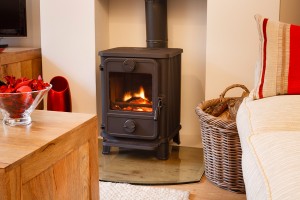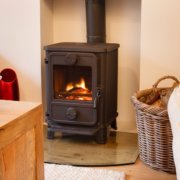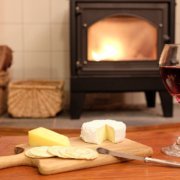Are you looking at installing a wood burner in your holiday cottage?
Last Updated on December 10, 2015 by admin

With winter now upon us, you might be considering installing a wood burner in your holiday cottage to make it more appealing to visitors during those colder months.
Wood burners can be a great way to heat your property; not only could you potentially reduce energy bills, but a roaring fireplace can also become a selling point for your cottage when visitors are looking to book a winter getaway.
We’ve taken a look at what you need to know when it comes to installing a wood burner or replacing your existing system.
Getting the right wood burner or solid fuel heating system
From multi-fuel open fires to biomass systems and inset stoves there are plenty of options available, no matter the size or shape of your cottage. When it comes to making the investment, do some research into which one will suit your property, and with a view to reducing potential costs, also work with any system that you already have in place.
Biomass boilers have become increasingly popular in recent times, due in part to the subsidies you’ll be able to gain on fuel bills as part of the Renewable Heat Incentive (RHI). If you are exploring this option you’ll need to bear in mind the high initial cost of purchasing the boiler itself, and always remember to get three quotes, along with references from at least two previous customers. For more information on biomass heating, please read our blog article here:
Who should install your wood burner?
When it comes to installing a wood burner, certain regulations must be followed in line with the Government’s Building Regulations Document J. It’s recommended you use a registered wood burner installer who will know their job inside out, rather than making any attempt at installation yourself.
Many companies will be registered with HETAS installer scheme and listed on the Government recognised Competent Person Schemes; you can find one near you by searching via the HETAS and Competent Persons Register:
Certification
If a registered installer such as those listed above has installed your wood burner, you’ll be given a Certificate of Compliance. This certificate is issued within 30 days of completion of the work to prove all Building Control obligations under Document J have been met.
Ensure you keep this in your records as evidence the work has been carried out by a competent professional.
Chimney fires; your maintenance responsibilities
If your holiday home has a wood burner it’s vital you regularly maintain it. There are in the region of 6,000 chimney fires in England each year; take steps such as regular sweeping to avoid the catastrophic consequences a fire can have on your holiday home.
For full information on complying with the fire safety act and chimney fire prevention please read our blog here:
- Fire Safety Law For Holiday Letting
- Reducing the risk of chimney fires
- Preventing the five most common causes of fire in holiday homes
Carbon monoxide alarms
When your new wood burner is in place you’ll also need to make sure you install a carbon monoxide alarm. On 11 March 2015 the housing minister Brandon Lewis announced that residential landlords in England would be required by law to install working smoke and carbon monoxide alarms in their properties. Carbon monoxide is a deadly gas which kills as many as 50 people in the UK each year; it’s produced when fuels such as gas, oil, charcoal, coal and wood do not burn completely.
A carbon monoxide alarm should be placed in the room as the wood burner / open fire and positioned on a wall or ceiling in a position as indicated in the instructions which accompany the unit. Your stove installer will advise you on where else in your holiday home you should place additional detectors.
For more information on the dangers of Carbon Monoxide and your responsibilities as a holiday let owner, please read our blog post here:
Additional guest safety tips
For your safety and that of your guests here are some additional best practice tips for those installing a solid fuel or wood burner in your holiday cottage. Provide the following:
- Instructions for safe operation, cleaning and disposal of cinders in your Welcome Information Pack
- Fire guard for containing sparks from open fires and preventing children and vulnerable adults from falling against or touching a hot stove or wood burner
- Metal bin, clearly marked for disposal of cool ash and cinders only
The holiday home insurance angle — helping you get back on your feet
Our holiday homeowners are covered for damage to their property as a result of fire. We also understand the potentially devastating financial impact having your holiday home unavailable for let as the result of a fire can have on your business. Our loss of income covers you for the potential loss of income you may suffer as a result of disruption or interruption caused by an insured event such as fire.
This means that should you lose trade then you’ll not have to pay the price of the loss of trade you suffer through cancellations and periods of not being able to accept bookings.
We also understand that repairs and maintenance after such an event won’t be immediate; that’s why our indemnity period extends to two years.
Boshers offer specialist holiday home insurance to owners across the UK. For more information on how a specialist insurer can help and support your holiday home business, please give us a call on 01237 429444.
Please note that this article gives only an overview of installing a wood burner in your holiday cottage and we suggest you take advice from a qualified professional before making any decisions in this area.









We are installing a log burner in a canvas safari tent. It is being installed by heatas engineer. Can you advice as to how far away a child fire guard surround should be away from the fire to prevent children from harm. I am thinking of getting a close mesh design so they can’t put arms through the rungs.
Many thanks
Thanks for your enquiry, we’re unable to give individual safety advice. Your HETAS engineer should be able to give you some guidance on ths matter. So far as we can see you should source a fireguard which complies to BS 8423:2010. Hope this helps and good luck with your new glamping venture.